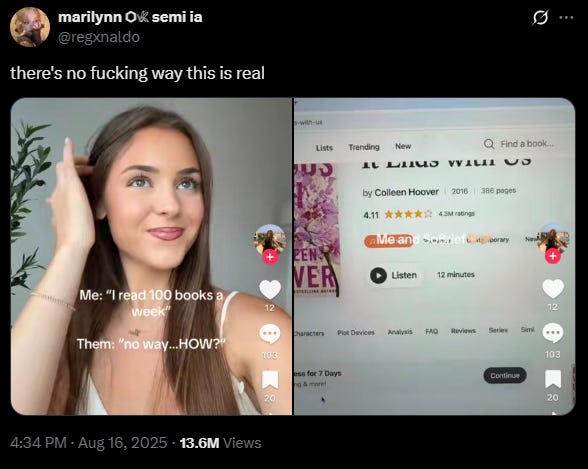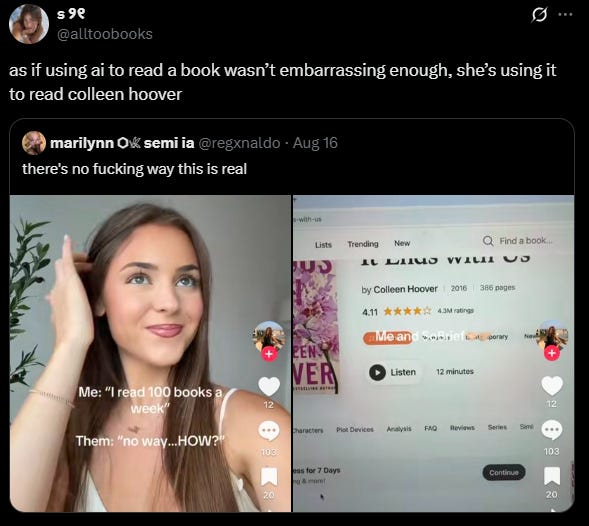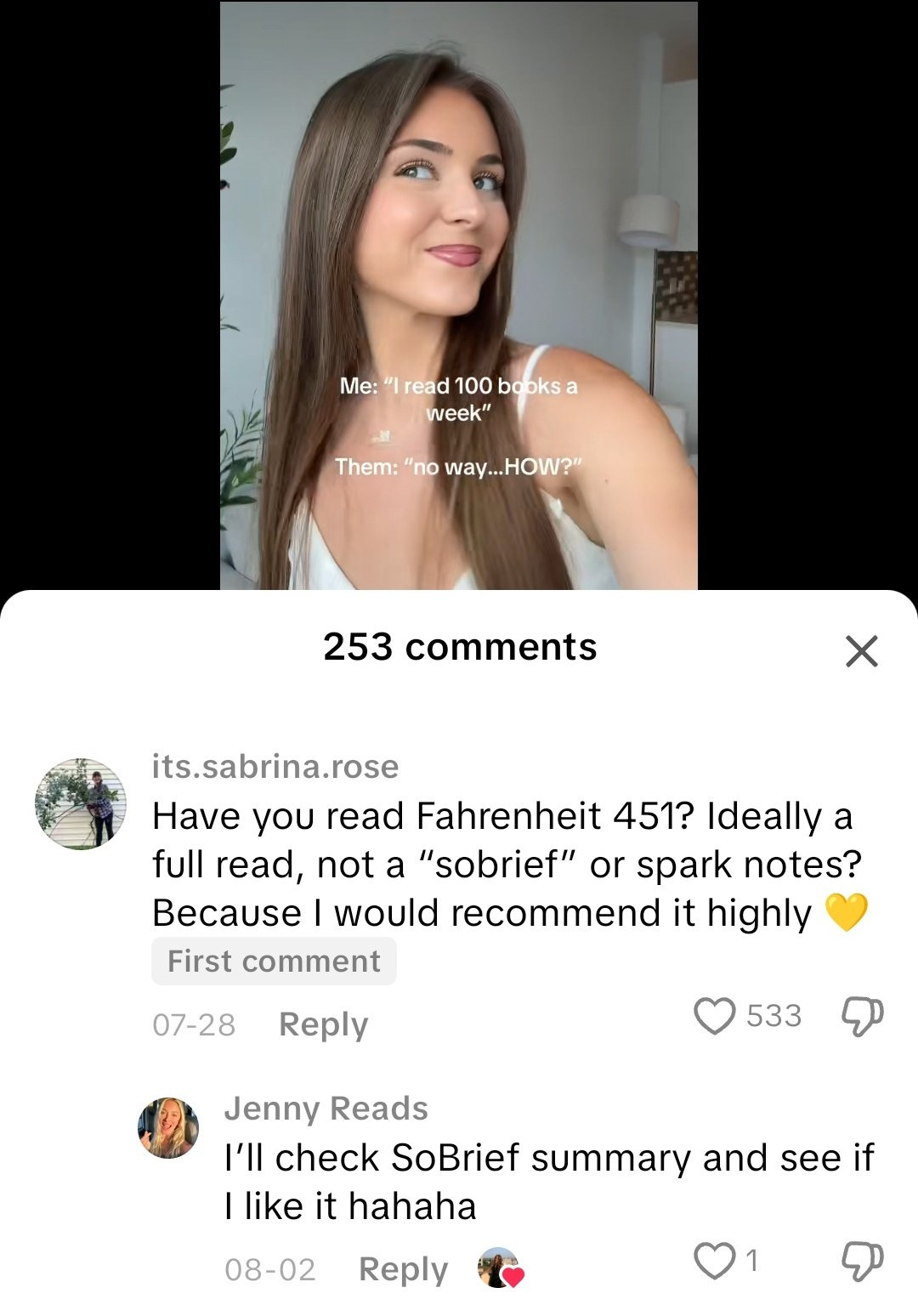why read books when AI can pretend you did?
on reading as social capital and how our dependency on AI will reshape our society
We are living in dystopian times.
This is something I think about on a daily basis. Every day, I come across something that terrifies me, something that makes me wonder about the future of society.
However, never in a million years would I have thought I would come across something like this:

While that TikTok is probably based on rage bait, marketing and/or a desperate need for attention, I am sure that there is truth to it.
And that highlights more than one problem. On the one hand, I can’t stop myself from thinking about the performativity of reading, the rise of Booktok and how that has shaped the literary world during the last five years.
On the other hand, though, the dangers of AI and how it’s shaping our society, turning the world into a future I never thought I would see, is what worries me most about all of this. So let’s break it down:
Cool girls read books: the performativity of reading
Listen, I love Addison Rae and I love the fact that everything she does is a performance. That is her brand. I find it pretty camp how blunt she is about it, and I will die on that hill.
However, girl… um. When it comes to this, it’s just so obvious that she wanted to be seen reading that book. No one reads while walking on the street with someone else. I also love that she covered her face with the memoir, showing the cover just in case the cameras hadn’t caught it.
And, besides that being a marketing tactic from her team, it is a pattern that has been reproduced by many celebrities over the past few years. In her video the ‘reading’ aesthetic, the Youtuber According to Alina tackles this issue perfectly.
From hyperconsumerism and rainbow-colored bookshelves to celebrities hiring book curators, reading as a private act has lost its substance.
When reading stopped being ‘nerdy’ and started being seen as cool, it became social capital, an aesthetic and an accessory.
And it gets even worse: it’s not only about hoping to project a certain kind of personality from the books you read. Now, the number of books you read seems to be the main focus.
It started with crazy Goodreads challenges (I still can’t stomach how someone could read more than thirty books a year, to be honest); and, then, as everything under capitalism, it was turned into a competition.
Who cares about quality when you can brag about quantity? Rainbow-colored shelves with hundreds of books, three-number reading counts—that’s how some of the Booktok girlies put themselves above others.
It’s just a tale as old as time: you get a hobby, and you turn it into an aesthetically pleasing competition. It’s capitalism at its core.

And it’s getting worse in the age of AI. I mean, sure. Why read books when AI can pretend you did? Why take the time you could spend scrolling on TikTok when you could just read one-hundred poorly written and probably biased summaries of what these books are about?
Chat, what should I have for dinner today?: where our dependency on AI might take us
Wanting to showcase that you read a certain amount of books a year to somehow put yourself above others is already concerning. However, what worries me the most is the fact that you are trying to make it easier by using AI summaries.
What worries me the most is the way you are dumping the process of reading and only caring about the result: nothing more than a number of books.
No knowledge gained, no tears shed, no emotions felt. Just a number.
I am truly terrified of how dependent we are becoming on AI…, and I include myself. I am not an AI apologist, but I am not going to lie and say I haven’t used it more times than I would like to admit… I am a victim of this anti-thinking epidemic as well.
I have used AI to write e-mails I don’t care about at work, sure. I have used AI to tell me what to eat when I was unsure about my diet (not proud at all about this one, especially after reading this article). I even visited New York a few weeks ago, and I asked AI to tell me which spots to visit, feeling nothing but ashamed and scared about how lazy I’ve become.
Traveling used to be a long, thoughtful process, and researching before actually going to a place used to be my favorite part. I would read travel blogs (I still dream of having one one day!), watch countless YouTube videos, and even get physical guides in second-hand stores.
Man, even searching for a specific location on TikTok to get recommendations from real people is better than what I did in New York.
I turned what used to be a week-long process (sometimes alone, sometimes a shared experience with someone else) into a soulless ChatGPT prompt. In less than five seconds, the machine had made an entire itinerary, tailored just for me.
Sure, I was running out of time and it made the whole thing easier. And I don’t doubt that AI, in very specific situations, can be useful. But, would it have killed me to use my brain? I felt as if I was killing a living tradition, taking its soul and giving its power to the machine.
It just all made me think about what Justine Bateman said to The Guardian in this article:
“They’re trying to convince people they can’t do the things they’ve been doing easily for years – to write emails, to write a presentation. Your daughter wants you to make up a bedtime story about puppies – to write that for you. We will get to that you will essentially become just a skin bag of organs and bones, nothing else. You won’t know anything and you will be told repeatedly that you can’t do it, which is the opposite of what life has to offer. Capitulating all kinds of decisions like where to go on vacation, what to wear today, who to date, what to eat. People are already doing this. You won’t have to process grief, because you’ll have uploaded photos and voice messages from your mother who just died, and then she can talk to you via AI video call every day. One of the ways it’s going to destroy humans, long before there’s a nuclear disaster, is going to be the emotional hollowing-out of people.”
We are forgetting how to fall in love with the process. We are losing our ability to think, act, and choose for ourselves. We are losing our souls.
And, when AI infiltrates our hobbies, our art, and our passions… What’s left of us?
What troubles me the most about that TikTok is the fact that people haven’t only stopped reading books—they are giving the power of their own critical thinking, thoughts, and beliefs to a machine.
And, as I see it, this is how they will eventually control our minds. They don’t even need to ban books anymore: they will make you believe that you are free, that you have a choice. They will give you a tool that promises an easier, more comfortable life (I mean, who wants to write e-mails, anyway?).
And then, they will strip knowledge down until it’s nothing. They will give you nothing but the apple’s core for you to eat, and you will become so used to it that, eventually, you won’t be able to digest full meals anymore.
If there is something I’ve learned in life, it’s that nothing is free. ‘Free’ AI tools are coming at the cost of our personal data, information, critical thinking skills, and basic knowledge. They are tools that, once we end up relying on them completely, will have the power to control us.
I haven’t read Fahrenheit 451 and I won’t ask SoBrief to summarize it for me. However, people keep highlighting something that’s terrifying: in the novel, before being banned and burnt, books ‘lost their value (…). Over the decades, people began to embrace new media (like film and television), sports, and an ever-quickening pace of life. Books were abridged or degraded to accommodate shorter attention spans’.
Sounds familiar, huh? Well, this novel was published in 1953. So I truly mean it when I say we are living in dystopian times.

I am afraid there will be a time when we will no longer be writing essays about how to get rid of your phone addiction. Instead of that, people will start needing guidance on how to stop using AI for every single area of their lives.
Because there is one thing that’s true: relying on AI can be addictive, purely because it’s easy, fast, and comfortable. But comfort always comes at a cost. And where there is comfort, there is no growth. Where there is comfort, there is no learning.
At this point, trying to avoid AI as much as possible is not only revolutionary… It’s an act of self-care.
Please, use your brain as much as you can.
If we stop thinking for ourselves, we end up losing ourselves.
Writing these essays always takes a long time. If you’d like to support my work, you can become a paid subscriber or buy me a coffee.




When I saw this ad my jaw was on the floor in disbelief. Truly a sign of dystopian times.
On a side note I did just want to quickly point out a perspective on reading more than 30 books a year since you said that is hard for you to imagine. I have a goal set for myself of 50 books - which would be my largest reading year ever - but what I've come to realize is thats really only about an hour of reading a day. I think most, if not all of us, could dedicate an hour to reading instead of tik tok, instagram, tv, etc.
The performativity aspect bugs me less than how AI further compresses our cognitive processes. AI can help expand our thinking, but most people are using it to make things more convenient, in ways that compress it. What's the point of reading fiction if they're just going to dump it down into its bare bones? I hope the writing/publishing industry doesn't change itself to fit AI culture.